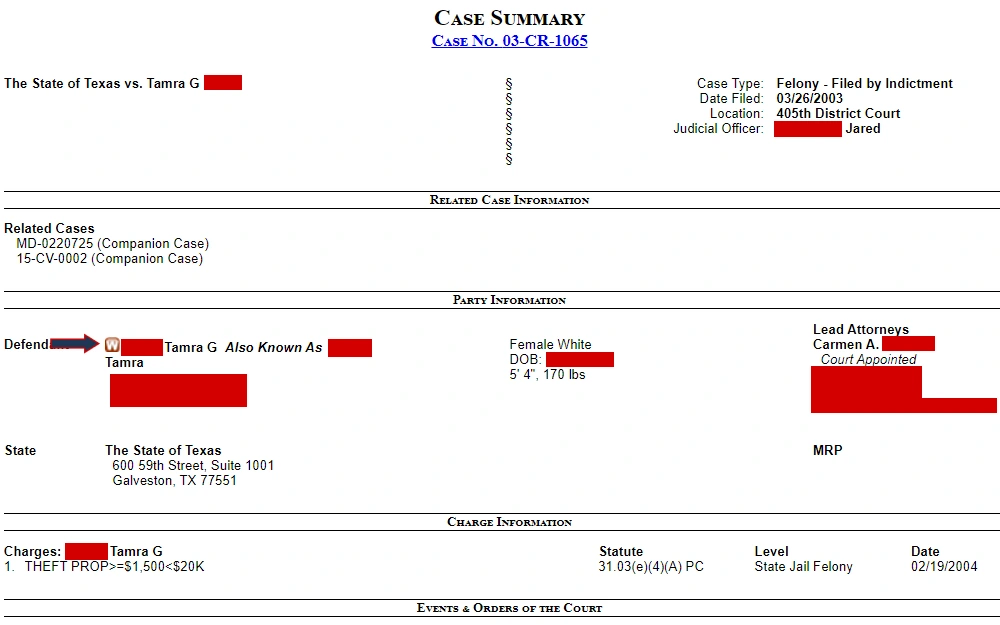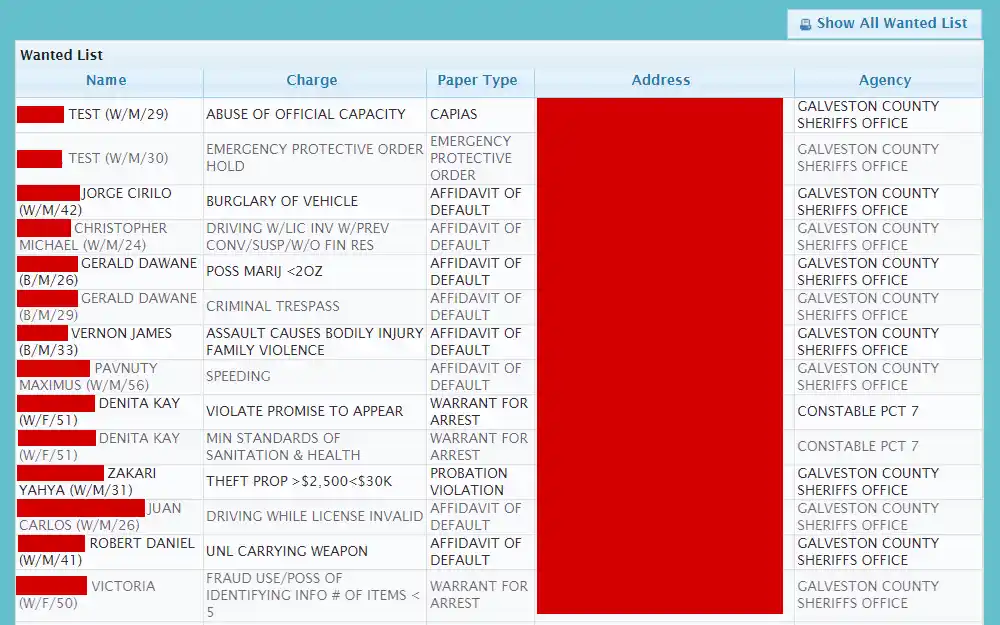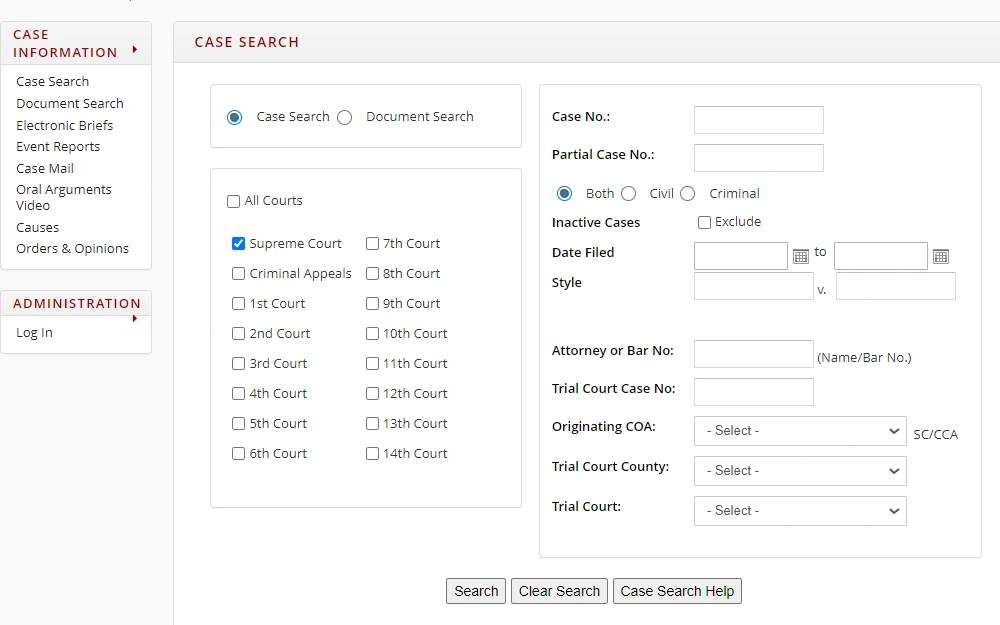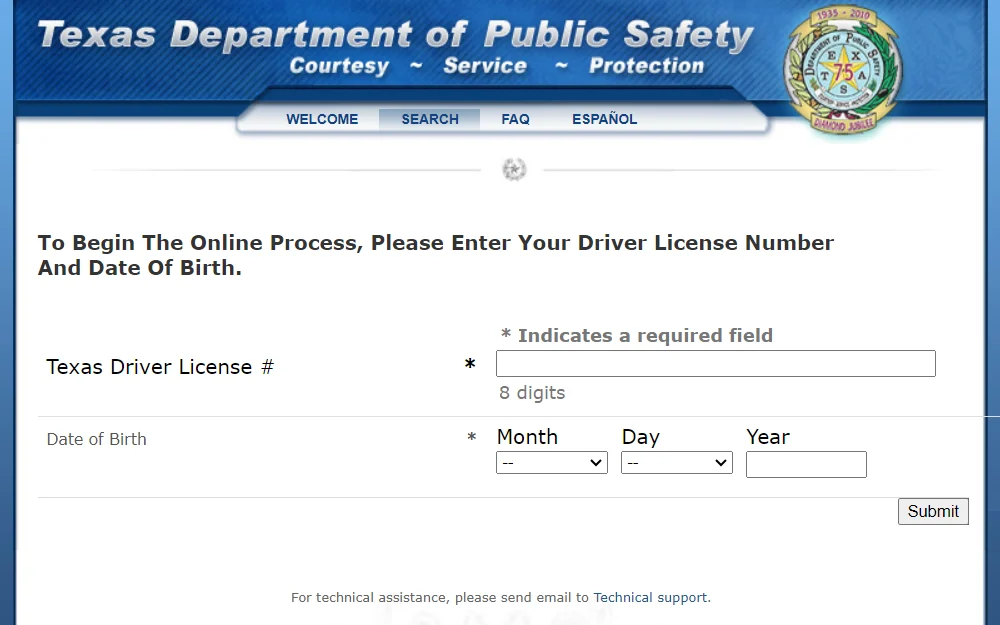Run a free Galveston County warrant search today to put any doubts about whether someone is wanted for a crime to rest.
Warrant records are part of the public sphere due to state and federal statutes — the Texas Public Information Act and the Federal Freedom of Information Act (FOIA). Interested persons can find warrant data on anyone from county and state resources, often at no cost.
This streamlined resource provides helpful search tools, links, and contact information for official agencies to help citizens find the warrant information they need or want.
Tracking Down Free Warrant Information in Galveston County Texas (an Overview)
Before commencing the search for wanted persons, some key information is required, the most critical being the subject’s full name. Other than this, searchers will need to know what county issued the warrant for the individual— considering that Texas has 254 counties, having this information will make the search more viable.
Some public agencies will also require that patrons provide information on the individual’s birth date (DOB) and Texas driver’s license number. Having auxiliary information like physical descriptors (sex, race, physical marks, etc.) can help increase the chances of finding the wanted person.
Public agencies in the state have the directive to make warrant data available for public consumption due to the Texas Public Information Act.1 This statute makes information produced by government entities public with certain exceptions, such as sealed court records.
The Freedom of Information Act (FOIA) also ensures that members of the public can access records produced by federal agencies, except for information that may compromise national security or trade secrets.2
In Galveston County, citizens have two main county agencies they can contact to acquire warrant information—the Clerk of Court and the Sheriff’s Office. In some cases, patrons may need to find warrant records beyond county lines; they may do this by contacting state agencies.
County agencies provide requestors with various ways to acquire warrant data, including electronic databases that can be queried online, through email and phone requests, or by providing information to citizens in person.
Several types of warrants are issued in the county, with the most common being arrest, search, and bench apprehension orders. Interested parties can seek information about most of these types of warrants, barring some exceptions.
Certain warrants, like search orders, may not be accessible to the public eye if they are active and outstanding. Allowing the public to access these records can tip off suspects who may destroy evidence of their crime, which will hamper law enforcement investigations.
How To Look Up Wanted Persons: Galveston County Warrant Search
As mentioned earlier, the two main county agencies that citizens can contact to view and acquire warrant records are the Galveston County Clerk of Court, the Sheriff’s Office and the County Consortium’s Police to Citizen (P2C) website.
Seek Warrant Information From the County Clerk: The district and county clerks are responsible for issuing warrants to individuals; the Galveston County Clerk of the Court is the custodian of these records.
Warrant records are part of court documents, and citizens can retrieve them online using the Galveston County Records Search Tool and the Tyler Odyssey Portal.3, 4
Depending on what court (civil, family, criminal etc.) issues the warrant, users can make a selection when using the county’s record search tool. After this selection, citizens can look up records by case, defendant name, attorney or date filed. To find information, open a case record and search through the “Docket Sheet.”

Citizens may also employ the Tyler Odyssey Portal to search court records using case numbers and full names. They may filter records by case number, attorney name, party name, etc.
In addition, interested parties can obtain copies of court records if they need the warrant data as a hard copy. Copies of court records may be purchased from the Galveston County Clerk’s Office in person at the address below or by calling 409.762.8621. The clerk charges $1.00 per page—the office will mail documents to the requestor.
Moreover, patrons can print case documents from the Records Search Tool outlined earlier.
Galveston County Clerk’s Office
722 Moody Avenue
Galveston, Texas 77550
Find Warrant Records via the Sheriff’s Office: The Galveston County Sheriff’s Office has a Warrant Division that processes apprehension orders received from district and county courts.6 The division does not have an online portal or database that can be accessed to acquire warrant data.
Consequently, the only way to verify in real-time if someone is wanted is by either calling 409.766.2300 or visiting the Sheriff’s Office, whose address is below. However, if the requestor has an outstanding warrant, they risk being arrested.
Galveston County Sheriff’s Office
601 54th Street
Galveston, Texas 77551
Alternatively, citizens may request Sheriff’s Office records in writing, which may be delivered by email, mail, or hand-delivered to the address above. Email requests are sent to [email protected]. Call the records division at 409.766.2320 for any questions.
Obtain Warrant Data From the P2C: The Galveston County Consortium’s Police to Citizen (P2C) has an online presence; this website hosts a database of information gathered from different law enforcement agencies in the county and state. P2C has an Online List of Wanted Persons that the public can access at no cost.7
The data set on a fugitive will have the following information:
- Full Names
- Charge
- Paper Type
- Address of Fugitive
- Agency (That Issued the Warrant)
While citizens can print the information on the site, they may also visit the police station to get a police report if desired.

Find Warrant Records From Local Jurisdictions: It is possible to seek warrant records from local municipalities and police departments in Galveston County. The county’s three most populated cities are Galveston, Dickinson and La Marque. Citizens from the City of Galveston must turn to the county to seek warrant records since the local police department does not provide these documents.
However, interested parties in Dickinson can turn to the municipal court by calling 281.337.6297 or the Dickinson Police Department at 281.337.4700. Requestors should have their driver license or ticket number with them to expedite the request. These records will not however reflect county information, but only those pertaining to city records.
Dickinson Municipal Court
4403 Highway 3
Dickinson, TX 77539
Lastly, wanted persons or private citizens who are searching for warrant information in La Marque can get in touch with the City Marshal Department at 409.938.9253.
The La Marque Municipal Court is considered a safe harbor as no persons can be arrested due to outstanding warrants. Defendants with the inability to pay outstanding fines and fees should visit the court to discuss options.
La Marque Municipal Court
431 Bayou Road
La Marque, TX 77568
How To Perform a Statewide Warrant Search in Texas
The search for fugitives may sometimes exceed county lines and into other locations in the state; patrons can find these warrant records through the Texas Department of Safety (DPS) and the state’s Judicial Branch.
The Texas DPS maintains a database of fugitives wanted by local, county and state law enforcement agencies. This index of still wanted fugitives can be accessed online and is free for public use; the agency also has a 10 Most Wanted Fugitives List.8 Each record on a fugitive contains the following information:
- Full & Alias Names
- Mugshot (Photograph)
- Reward Amount
- Physical Descriptors (Race, Weight, Height, Sex)
- Date of Birth
- Scar, Mark & Tattoo (SMT)
- SID, FBI & TDC Numbers
- Wanted For
- Gang Affiliations
- Address

Citizens may anonymously submit tips electronically to the DPS or call Texas Crime Stoppers at 1.800.252.TIPS (8477) or 911. If they have any questions, they may contact the DPS using the main customer service line at 512.424.2000. Moreover, vigilantes can use iWatch to report suspicious activity or call 844.643.2251.
Moreover, members of the public who want to check the warrant of someone with a Texas driver’s license and know this information can scour a public database to confirm if they have an apprehension order.9
Lastly – as mentioned previously – interested parties can also look for warrant records through court documents. However, they may use a Texas Court Records Search Tool that allows them to find court records from any of the trial courts in the state.10

Users can select the trial court and county that hosted the case and review the court documents to try to find further data on warrants.
Types of Warrants, What They Mean & Their Significance
There are several types of warrants in Galveston County, Texas; the most common are arrest, search and bench apprehension orders.
A warrant is a writ (order) that allows law enforcement to bring individuals into custody or to search a premises.11 These writs infringe on citizens’ rights, such as freedom and security in their premises; as a result, the Fourth Amendment has permitted law enforcement agencies to execute warrants only if probable cause exists.
Search Warrant— Search warrants are orders written and issued by a judge or magistrate; they direct law enforcement officials to search a property and seize any items for evidence.
Arrest Warrant— Arrest orders authorize law enforcement agencies to take individuals suspected of crimes into custody. Arrest warrants include bench, blue, capias, and alias orders (as described below).
Bench Warrant— Judges issue bench warrants when defendants are found to be in contempt of court. This can be for several reasons, but a common one occurs when individuals fail to appear at a hearing.
Blue Warrant— Also known as parole warrant, these apprehension orders are for offenders who’ve violated the terms of their supervision. Typical reasons include failing to report to the parole officer or committing crimes.
Probation Warrant— Similar to blue warrants, probation writs are issued to convicted offenders who fail to honor their probation conditions. They grant the police authority to take these individuals into custody.
Alias Warrant— Judges issue alias warrants to defendants who haven’t appeared in court before a plea is entered. This becomes an additional charge.
Capias Warrant— Convicted offenders who fail to pay fines associated with the judgment will have capias warrants issued against them. Paying the fine or accruing jail term in lieu of paying the amount owed clears the warrant.
Civil Capias Warrant— These warrants are issued to defendants in civil cases who repeatedly fail to comply with court orders.
Traffic Warrant— Drivers who don’t pay their traffic violation fines will receive arrest warrants. Sometimes, these are be issued if the payments are 30 days overdue.
Fugitive Warrant— Judges issue fugitive warrants to suspects who have committed crimes out of state but are in Galveston County.
Governor’s Warrant—Governors’ offices issue these warrants to have suspects extradited to the state in which they committed a crime.
Child Support Warrant— Parents who fail in their obligations of making child maintenance payments receive child support warrants.
How To Settle an Active Warrants in Galveston County Texas
Settlements of outstanding and active warrants is important to ensure that defendants are not taken into custody, causing unnecessary embarrassment and inconvenience.
Upon confirming that someone else – such as a family member or friend – has a warrant, it’s best to inform them of their wanted status. This is particularly necessary because often, defendants may not know if there’s an active warrant for their arrest.
In the case of strangers who are fugitives and often dangerous, the best course of action is to contact law enforcement agencies. Dealing with wanted persons directly is dangerous and irresponsible.
Citizens in the county can get in touch with Galveston County Crime Stoppers by anonymously submitting a tip online, calling 409.763.TIPS (8477) or downloading the mobile app. In addition, vigilantes may electronically follow up on a tip they submitted.
At the state level, patrons may contact the Texas Department of Public Safety (DPS), which also allows citizens to report suspicious activity online. They may also contact the DPS by calling 844.643.2251 or utilizing iWatch, an online reporting system for suspicious and criminal activity.
Warrants are active and outstanding and are resolved only when the subject is taken into custody or takes steps to quash the warrant such as appearing in court or paying fines.
To cure a warrant in Galveston County, citizens have several options, including contacting the Justice of the Peace Court Clerk at (281)316-8716 or by calling the County Sheriff’s Office at 409.766.2300 if the arrest order originated from that office. The defendant should be prepared to provide the full name, date of birth, and Texas driver’s license or identification number.
In addition, defendants who may be unsure of their warrant status and have a Texas driver’s license can check the public database at no cost to determine the same.9

The court will subsequently provide instructions on how to resolve the warrant. This may include but isn’t limited to paying fines, rescheduling court dates, and settling accrued child support payments. This also applies when calling the sheriff’s office to resolve a warrant.
It is recommended to enlist the services of a lawyer when there is an active warrant, especially if it’s older; they have more expertise in this area and can help dismiss a warrant if it was issued in error, or they may be able to obtain a dismissal or reduction of the charges.
Finally, particular warrants can only be quashed if the defendant turns themselves in – as is the case with severe crimes. It’s highly advisable to hire a lawyer, enlist a bonds agent’s services in case a bail amount is set, and inform close relatives beforehand.
Running a Galveston County warrant search can be executed through both county and state agencies. This article offers an array of advice and guidance, such as links to public agencies, to empower citizens to find the information they seek.
References
1Texas Constitution and Statutes. (n.d.). Government Code Title 5 – Open Government; Ethics, Subtitle A – Open Government, Chapter 552 – Public Information, Subchapter A – General Provisions. Retrieved February 14, 2024, from <https://statutes.capitol.texas.gov/Docs/GV/htm/GV.552.htm>
2U.S. Department of Justice, Office of Information Policy (OIP). (n.d.). Freedom of Information Act Statute. FOIA.gov. Retrieved February 14, 2024, from <https://www.foia.gov/foia-statute.html>
3Galveston County Clerk. (n.d.). Galveston County Records Search. Retrieved February 14, 2024, from <https://publicaccess.galvestoncountytx.gov/PublicAccess/default.aspx>
4Galveston County, Texas. (n.d.). Smart Search. Tyler Odyssey Portal. Retrieved February 14, 2024, from <https://portal.galvestoncountytx.gov/Portal/Home/Dashboard/29>
5Galveston County Clerk. (n.d.). Case Summary – Case No. 03-CR-1065. Retrieved February 14, 2024, from <https://publicaccess.galvestoncountytx.gov/PublicAccess/CaseDetail.aspx?CaseID=692058>
6Galveston County Sheriff’s Office. (n.d.). Warrants Division. Retrieved February 14, 2024, from <https://sheriff.galvestoncountytx.gov/warrants.html>
7Galveston County Consortium. (n.d.). Wanted List. Retrieved February 14, 2024, from <https://p2c.galvestoncountytx.gov/wantedlist.aspx>
8Texas Department of Public Safety. (n.d.). Texas 10 Most Wanted Fugitives. Retrieved February 14, 2024, from <https://www.dps.texas.gov/texas10mostwanted/mostwanted/fugitives>
9Texas Department of Public Safety. (n.d.). Failure to Appear / Failure to Pay Program. Retrieved February 14, 2024, from <https://www.texasfailuretoappear.com/search.php>
10Texas Judicial Branch. (n.d.). TAMES Search. Retrieved February 14, 2024, from <https://search.txcourts.gov/CaseSearch.aspx?coa=cossup&s=c>
11Cornel Law School, Legal Information Institute. (n.d.). Warrant. Retrieved February 14, 2024, from <https://www.law.cornell.edu/wex/warrant>
